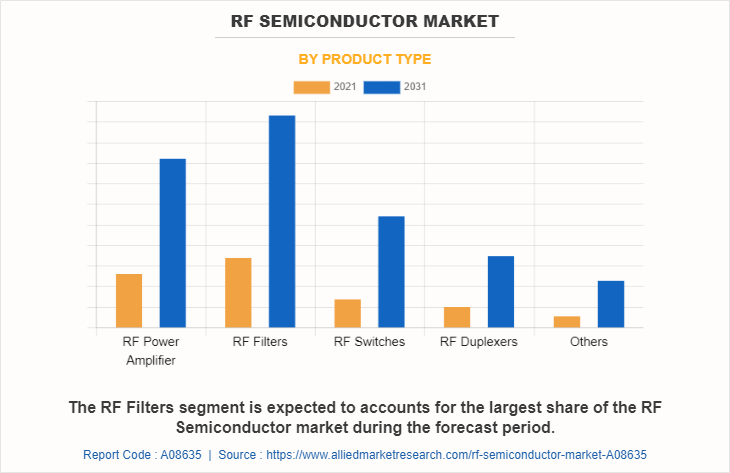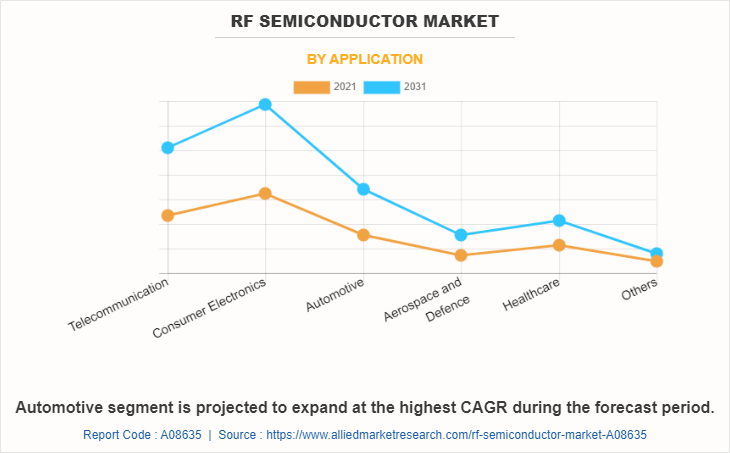RF Semiconductor Market Research, 2031
The global RF semiconductor market was valued at $18.9 billion in 2021 and is projected to reach $39.6 billion by 2031, growing at a CAGR of 8.4% from 2022 to 2031.
RF, or radio frequency, is a measurement technique used to determine the vibrational rate of electromagnetic waves. The frequencies of the electromagnetic waves range from 300 GHz to 9 kHz. Radio waves are mainly used for wireless communication using antennas and transmitters. An RF semiconductor is a device used as a switch or rectifier in power electronics for wireless communication. The RF semiconductor market includes devices such as RF power amplifiers, RF filters, RF switches, and low-noise amplifiers. RF devices are made from materials such as silicon, silicon germanium, gallium arsenide, gallium nitride, and indium phosphide.
RF semiconductor devices are widely used in cellular and wireless infrastructure. The increase in the use of smartphones has increased people's interest in using social media and the Internet. There is a rise in the demand for high-speed mobile broadband internet with the increase in the need for higher data rates and greater spectral efficiency. Therefore, the use of the Internet has led to a rapid increase in Long Term Evolution (LTE). In addition, RF power devices are also used in lighting applications, the development of smart cities around the world, and recent technological developments such as increasing power density up to 1000 watts and decreasing RF power are the reasons for the growth of the RF semiconductor market today.
![]()
The increase in the adoption of effective management solutions in the energy industry is attracting many vendors to their industry-focused product innovations. This further expands the range of applications for high-frequency power semiconductor components. For example, Cadence Design Systems, Inc. announced that it has enhanced the Cadence Voltus IC Power Integrity Solution with a largely parallel (XP) algorithm option that employs distributed processing technology for power grid deregistration with advanced node processing technology.
Additionally, RF power semiconductors are utilized in a wide range of fields, including marine, military, aerospace, energy, medical, and air traffic control systems. They also have numerous applications in consumer electronics, aerospace, automotive, telecommunication, and data communication, boosting market expansion further. To meet the growing demand in the industry, the major market players have been introducing new products to the market, which will increase competition. For instance, Skyworks Solutions, Inc. introduced the SKYH22001 and SKY22002 RF power amplifiers in July 2019 for use in aerospace and defense applications.
The RF semiconductor market is segmented into Product Type and Application.
By product type, the market is segmented into RF power amplifiers, RF switches, RF filters, RF duplexers, and other RF devices. The RF filter segment is the highest revenue contributor to the market.

By application, the market is categorized into telecommunication, consumer electronics, automotive, aerospace & defense, healthcare, and others. The consumer electronics segment is the highest revenue contributor to the market.

Region-wise, the RF semiconductor market trends are analyzed across North America (the U.S., Canada, and Mexico), Europe (UK, Germany, France, and the rest of Europe), Asia-Pacific China, Japan, India, South Korea, and the rest of Asia-Pacific), and LAMEA (Latin America, the Middle East, and Africa). Major organizations and government institutions in the country are intensely putting resources into this industry.
By Region
Asia-Pacific would exhibit the highest CAGR of 8.62% during 2022-2031.
Country-wise, the U.S. acquired a prime share in the RF semiconductor market forecast in the North American region and is expected to grow at a significant CAGR during the forecast period of 2019-2031. The U.S., holds a dominant position in the RF semiconductor market size, owing to the rise in investment by prime vendors to boost the RF semiconductor for consumer electronics and IT & telecom applications.
In Europe, the UK, dominated the RF semiconductor market share, in terms of revenue, in 2021 and is expected to follow the same trend during the forecast period. However, Germany is expected to emerge as the fastest-growing country in Europe's RF semiconductor with a notable CAGR, due to advancement in the automotive industry which drives the usage of microelectronics in the country and thus creates lucrative growth opportunities for the RF semiconductor market in Germany.
In Asia-Pacific, the rest of Asia-Pacific is expected to emerge as a significant market for the RF semiconductor industry, owing to new product developments and a significant rise in investment by prime players and government institutions.
In the LAMEA region, the Latin American country garnered significant market share in 2021 due to the adoption of new technologies, digital transformation, and connectivity are reshaping the future of the automotive and consumer electronics industry in Latin America. Moreover, the Middle East region is expected to grow at a significant CAGR from 2022 to 2031, owing to shifts in artificial intelligence, industry 4.0, and smart technological changes in recent years, which is expected to reshape the growth of the RF semiconductor in the Middle East.
Top Impacting Factors
The major factors driving the RF Semiconductor market growth are the rapid development of 5G technology and the rapid adoption of IoT technology has increased the need for robust network capacity and has developed the RF semiconductor market. On the other hand, the use of alternative materials such as gallium arsenide or gallium nitride improves device efficiency but also increases the cost of RF devices which is restraining the market growth during the anticipated period. Furthermore, the increased use of RF energy in the number of smart city projects in various countries around the world is creating the RF Semiconductor market opportunity.
Competitive Analysis
The global RF semiconductor market is highly competitive, owing to the strong presence of existing vendors. Vendors of the RF semiconductor market with extensive technical and financial resources are expected to gain a competitive advantage over their competitors because they can cater to market demands. The competitive environment in this market is expected to increase as technological innovations, product extensions, and different strategies adopted by key vendors increase.
Key Developments/ Strategies
Analog Devices Inc., Microchip Technology Inc., MACOM Technology, NXP Semiconductors, Qorvo, Inc., Qualcomm Incorporated, Texas Instruments Inc., Toshiba Electronic Devices & Storage Corporation, TDK Electronics, and Teledyne Technologies Inc. are the key players of the RF semiconductor market. Top market players have adopted various strategies, such as acquisition, agreement, business development, business expansion, collaboration, product launch, innovation, and product expansion to expand their foothold in the RF semiconductor market.
In February 2021- Qualcomm Technologies, Inc. launched the next generation of Qualcomm RF Front End (RFFE) solutions for high-performance 5G mobile devices. The solutions are designed to support advanced performance and power-efficiency capabilities in the newly announced Qualcomm Snapdragon X65 and X62 5G Modem-RF Systems – bringing together modem, RF transceiver, RF front-end components with artificial intelligence (AI) assistance, and mm-Wave antenna modules to enable OEMs to design premium 5G devices.
In October 2021 - Qualcomm Technologies, Inc., launched Qualcomm ultraBAW RF filter technology for bands up to 7 GHz, another innovation that builds on the company’s modem-to-antenna solution that is driving high-performance 5G and connectivity systems across wireless product segments.
Key Benefits for Stakeholders
- This report provides a quantitative analysis of the market segments, current trends, estimations, and dynamics of the RF semiconductor market analysis from 2021 to 2031 to identify the prevailing RF semiconductor market opportunities.
- The market research is offered along with information related to key drivers, restraints, and opportunities.
- Porter's five forces analysis highlights the potency of buyers and suppliers to enable stakeholders to make profit-oriented business decisions and strengthen their supplier-buyer network.
- An in-depth analysis of the RF semiconductor market segmentation assists in determining the prevailing market opportunities.
- Major countries in each region are mapped according to their revenue contribution to the global market.
- Market player positioning facilitates benchmarking and provides a clear understanding of the present position of the market players.
- The report includes an analysis of the regional as well as global RF semiconductor market outlook, key players, market segments, application areas, and market growth strategies.
RF Semiconductor Market Report Highlights
| Aspects | Details |
| Market Size By 2031 | USD 39.6 billion |
| Growth Rate | CAGR of 8.4% |
| Forecast period | 2021 - 2031 |
| Report Pages | 322 |
| By Product Type |
|
| By Application |
|
| By Region |
|
| Key Market Players | NXP Semiconductors, Analog Devices Inc., Toshiba Electronic Devices & Storage Corporation, Teledyne Technologies Inc., Qorvo, Inc., Microchip Technology Inc., MACOM Technology, Qualcomm Incorporated, TDK Electronics, Texas Instruments Inc. |
Analyst Review
The RF semiconductor market is being driven primarily by the rapid rise in smartphone and tablet demand as well as the development of next-generation wireless technologies. In addition, manufacturers of RF power semiconductors are being encouraged to accelerate the development of RF technologies by recent advancements in a variety of industrial fields, including automotive, consumer electronics, and telecommunications. The RF power semiconductor market is also being bolstered by the rising digitalization trend and the proliferation of smart city projects in a variety of nations.
Apart from that, the increasing importance of energy efficiency and the booming IoT market are some of the factors expected to create potential growth opportunities for the RF power semiconductor market. In addition, increasing penetration of network technology and the emergence of higher generation networks are also some of the factors driving the RF power semiconductor market.
The RF Semiconductor Market is expected to grow at a CAGR of 8.35% from 2022-2031.
Consumer Electronics is the leading application of the RF Semiconductor Market.
Asia-Pacific is the largest regional market for RF Semiconductor.
The industry size of the RF Semiconductor market is estimated to be $18,884.25 million in 2021.
The top companies to hold the market share in the RF Semiconductor market are Analog Devices Inc., Microchip Technology Inc., MACOM Technology, NXP Semiconductors, Qorvo, Inc., Qualcomm Incorporated, Texas Instruments Inc., Toshiba Electronic Devices & Storage Corporation, TDK Electronics, and Teledyne Technologies Inc.
Loading Table Of Content...
Loading Research Methodology...



